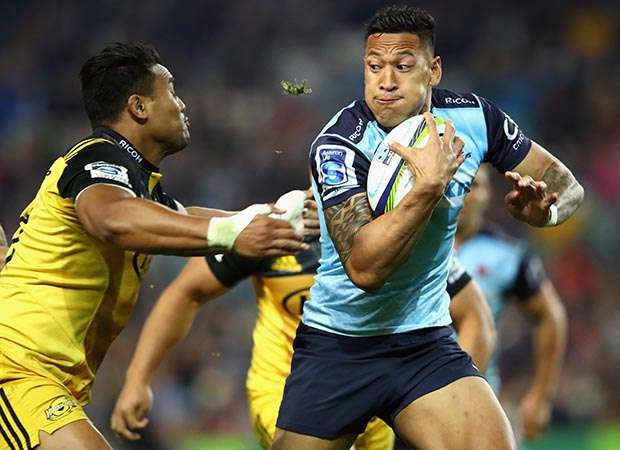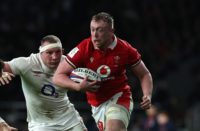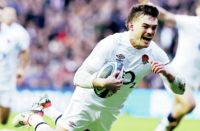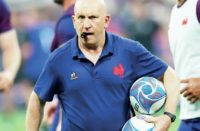 This Rugby Championship is the start of a new cycle for the Southern Hemisphere, which leads to Tokyo and the next World Cup in 2019. Argentina start with an away game against South Africa, and the rise of the Pumas has been nothing short of sensational. If they can push on from the form they showed in the World Cup last year then this competition will be bigger than it has ever been.
This Rugby Championship is the start of a new cycle for the Southern Hemisphere, which leads to Tokyo and the next World Cup in 2019. Argentina start with an away game against South Africa, and the rise of the Pumas has been nothing short of sensational. If they can push on from the form they showed in the World Cup last year then this competition will be bigger than it has ever been.
However, while I'm normally enthused by Super Rugby, this season it didn't grab me. Maybe that's because after the highs of the World Cup, and then England winning 3-0 in Australia, the extended format seemed messy and made the whole thing a bit of an anti-climax.
By contrast the Championship could be great, although they could change it up a bit fixture-wise instead of starting and ending with the same matches every season.
New Zealand will rightly start as favourites, and although it is impossible to replace the amount of experience they have lost straightaway, they appear to have kicked-on already. There's continuity with Kieran Read taking over as captain, as well as through experienced forwards like Owen Franks and Brodie Retallick. In addition, Sam Cane comes in for Richie McCaw having already amassed 35 caps, while the All Blacks also had plenty of time to get used to life without Dan Carter because he was frequently injured.
The midfield looks like the area where they will all have to rebuild most after the retirements of Ma'a Nonu and Conrad Smith, and the recent injury to Sonny Bill Williams, but because of their rugby structure they will replace an old part with a brand-new one which is often even better. In this instance the likely centre pairing is Ryan Crotty, who has been around for some time, and Malakai Fekitoa, another back who has bedded-in over the past couple of seasons.
At fly-half Beauden Barrett is the man in-form, and he has the same hallmarks about him as Carlos Spencer. Barrett sees the game differently to a more conventional 10 like Aaron Cruden, but with the midfield changes I can see head coach Steve Hansen starting with the more experienced Cruden.
New Zealand are relentless, and I don't think they will be affected too much if they have a good or bad season. Which-ever way it goes Hansen is a deadpan character and he's unlikely to let it unsettle them.
Australia are coming off a really average Super 18 as well as an unconvincing series loss against England before that, and the domestic landscape is unsettled despite a bigger TV deal for Rugby Union. It's a great pity that there is not more of a buzz around the 15 man code in Australia, but getting stuffed by England highlighted their struggles. When you see the disrespectful adverts decrying the England side it makes you wonder about their mindset, especially when it is so misinformed and misses the target by so much that it makes them look silly.
So, for the Wallabies it's a question of restart, reboot and rebrand so that they can go into this season with a bang. The way Australia played in the build-up to the 2015 World Cup, and during the tournament, excited me – and I like Michael Cheika. The head coach says it as it is, and he took the loss to England on the chin without making too many excuses.
Cheika has still got a strong enough squad to retain the trophy. Australia's scrummaging has been shored-up under Mario Ledesma's tutelage, and should be reasonably solid, and overall the Wallaby forwards are pretty competitive.
The main problem against England was that Australia were not clever enough or strong enough in attack to get round the white defensive wall, and that was a worry, especially given the way they shredded England in the World Cup. My feeling is that New Zealand, South Africa and Argentina would have come up with the answers that the Aussies couldn't find.
It's true that Australia didn't have Matt Giteau for the England series, but he's getting on – and, although he's been recalled, the Wallabies still have to work out how to make the most of a special player like Israel Folau. Sometimes it seems that the whole attacking strategy seems to call on Folau to do everything, and if they want him to be effective their reliance on him has to be less obvious.
For instance, Tevita Kuridrani had a good World Cup but was not very noticeable against England, and although Bernard Foley had his moments at fly-half against Eddie Jones' tourists, he has to step up in terms of consistency. The good news for Cheika is that with Matt Toomua and veterans like Adam Ashley-Cooper, Will Genia and Drew Mitchell back in the squad everybody will be on message and understand what is required.
One area that needs improvement is scrum-half because at the moment neither Genia nor Nick Phipps are in the same league as New Zealand's Aaron Smith, and not to be able to produce two Test-quality 9s when you have five franchises to pick from is not good enough.
Since losing to Japan in the World Cup it's been a question of let's get back to basics for South Africa – and that's what Allister Coetzee is going to do with his squad. It seems certain that Heyneke Meyer's successor will build on a big scrum featuring Duane Vermeulen, François Louw, Eben Etzebeth and Lood de Jaeger, and that inside-centre Damien De Allende could be a crucial component to the game plan. De Allende is a very big unit who is punchy on the gain-line and is not short of pace.
If he learns to step outside more, rather than cutting inside, he is capable of causing big problems because there are not many fly-halves who will fancy it if he attacks their outside shoulder. However, if he cuts back then he will run into the likes of Michael Hooper and Cane.
South Africa's comeback against Ireland over the summer showed they are reverting to a power game, and when it's done well it can be overwhelming.
When the Springboks pass the ball just before contact, and the midfield and the back five of the pack combine together, they can be an irresistible force. However, at the moment Coetzee's side are a bit too disjointed, with people playing their own tunes rather than being part of a symphony.
South Africa could finish last unless they start well against Argentina, who will come into the Championship under the radar mainly because we haven't seen much of them since the World Cup. While many of the squad play for Argentina's new Super 18 franchise, the Jaguares, they found their first season in the Super 18 hard going with the massive travelling demands.
Set against that, Argentina have magicians in their back three, with Joaquin Tuculet, Juan Imhoff and Santiago Cordero brilliant to watch. However, the Pumas will have to learn that shipping the ball to them doesn't work automatically, and that the 9-10 pairing of Martin Landajo or Tomas Cubelli at scrum-half and Nicolas Sanchez at fly-half will have to vary the tactical menu.
They have a formidable pack, and tight-head Ramiro Herrera could be the new Carl Hayman. His challenge will be to stay effective for the full 80, but he has the physicality and workrate to become one of the great props.
Argentina's pool stage game against New Zealand in the last World Cup showed how good they can be, but the senior men have to push the Pumas to the next level so that their players become as well-known as their New Zealand, Australian and South African counterparts.


























